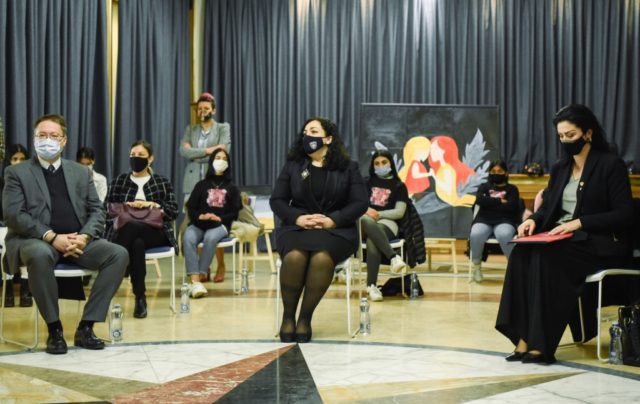On Monday, 8th of March 2021, UN Women jointly the Office of the President, and partner IPKO Foundation, supported by the British Embassy in Kosovo organized an event with young women and girls from Roma, Ashkali and Egyptian communities, to inspire them to continue their education and become leaders of tomorrow. During the event, an exhibition was opened with the art works of the girls present, thus showing how art can be a tool to break down barriers, gender stereotypes and empower girls.
In her opening speech H.E Acting President Vjosa Osmani, stated “Today, young women and girls prove that they are unstoppable wherever they are. They promote education by standing up against gender-based violence, seeking action in relation to the environment in which they live, and above all seeking a seat in decision-making processes. Only together will we make the voice of young women and girls heard at every table where decisions are made for them, for the society and for the whole world.”
Opening remarks were also held by British Ambassador to Kosovo, Nicholas Abbott who acknowledged the disproportionate impact of the pandemic on women and girls, “The burden of caring for children and the elderly has fallen on women and girls, while at the same time they have continued to work from their homes. And this situation has been even more difficult for those young girls and women who have already been at a disadvantage even before the pandemic. We are talking about women and girls from the most vulnerable communities, who do not always have easy access to education, training and employment.”
This event was organized in line with this year’s theme for International Women’s Day (8 March), “Women in leadership: Achieving an equal future in a COVID-19 world,” celebrates the tremendous efforts by women and girls around the world in shaping a more equal future and recovery from the COVID-19 pandemic and highlights the gaps that remain. Vlora Tuzi Nushi, Head of UN Women stated “When women lead, we see positive results. However, women are still faced with discrimination when it comes to leadership. We need more women in leadership which represents women and girls in all their diversity and abilities, and across all cultural, social, economic and political situations.”
Opening remarks were also held by Abetare Gojani, Director of IPKO Foundation, who highlighted the need to continue working with women from vulnerable groups, so they can continue enjoying their basic human rights. After the opening remarks, Shpresa Agushi, Executive Director of the Network of Roma, Ashkali and Egyptian Women’s Organizations in Kosovo, delivered an inspirational speech. Mrs. Agushi serves as a role model for all the young women, who has been a key figure in the fight to end early marriages among girls from these communities and to increase activism among Roma, Egyptian and Ashkali youth.
The “Return to (New) Normal in Kosovo: Strengthening resilience through a safe and inclusive return to normality in health and education in the wake of COVID-19” project financed by the British Embassy in Kosovo, and implemented by UN Women, UNFPA, UNICEF, and the World Health Organization, is working towards “leaving no one behind” in COVID-19 response and recovery. UN Women is applying an intersectional approach to reach those left furthest behind, including young women and girls from non-majority communities and those with disabilities. Most young women from these communities do not own Information Technology equipment or have access to the internet and are thus excluded from the new online education system. Coupled with increased domestic care duties at home, young women and girls are at risk of losing their academic year and to ultimately drop out of school. In fact, a Rapid Assessment conducted in Kosovo in May 2020 by UN Women, UNDP, UNFPA and UNKT found that the pandemic has exacerbated the burden of women and girls’ unpaid care work, hindering and limiting their professional and educational performances.
